March 2024
The fight against the Administrative State continues for the New Civil Liberties Alliance, and the federal government is still up to its unlawful censorship schemes. This month, the U.S. Supreme Court heard Murthy v. Missouri, NCLA’s historic case against government censorship of constitutionally protected speech online.
Additionally this month, NCLA secured a victory that ends a government attempt to force cryptocurrency mining companies to hand over sensitive information about their operations, petitioned SCOTUS to revisit a 120-year-old precedent that led to vaccine mandate abuses amid the pandemic, and worked to free a client who has been trapped in the SEC’s adjudicatory version of the Hotel California.
Thank you for being a part of the New Civil Liberties Alliance and for your support. Keep scrolling to learn about these cases and everything else happening at NCLA. Don’t forget to click the link below to provide our attorneys with the resources they need to keep winning!
The Latest
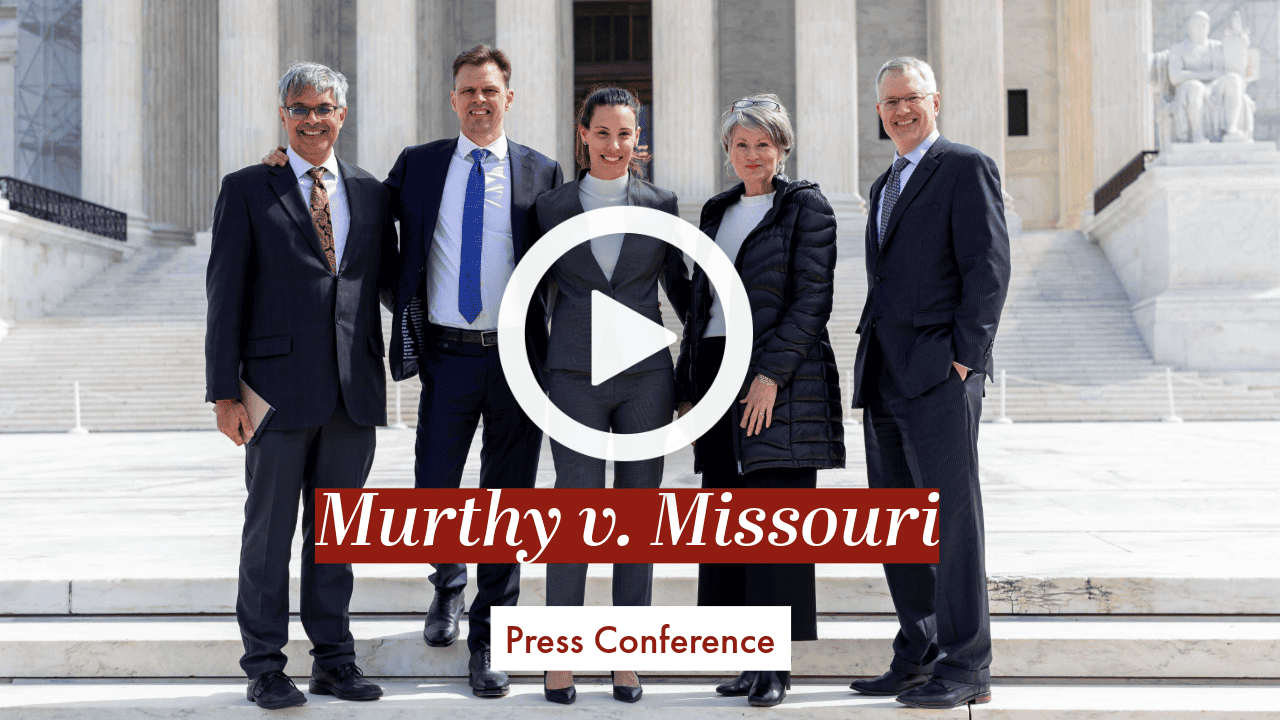
Dr. Jayanta Bhattacharya, Dr. Aaron Kheriaty, NCLA Litigation Counsel Jenin Younes, Ms. Jill Hines, and NCLA President Mark Chenoweth outside the Supreme Court
Supreme Court Hears Oral Argument in Pivotal NCLA Case Against Gov’t Social Media Censorship
The Supreme Court heard oral argument in NCLA’s Murthy v. Missouri case considering whether to uphold a historic preliminary injunction granted by the U.S. Court of Appeals for the Fifth Circuit. The injunction, temporarily stayed by the Court, would bar officials from the White House, CDC, FBI, Cybersecurity and Infrastructure Security Agency (CISA), and Surgeon General’s office from coercing or significantly encouraging social media platforms to censor constitutionally protected speech. The injuries to NCLA’s clients—Drs. Jayanta Bhattacharya, Aaron Kheriaty, and Martin Kulldorff, and Ms. Jill Hines—supplied standing for many of the arguments made in the courtroom, urging the Court to uphold the injunction in defense of Americans’ First Amendment rights. Read more >>>
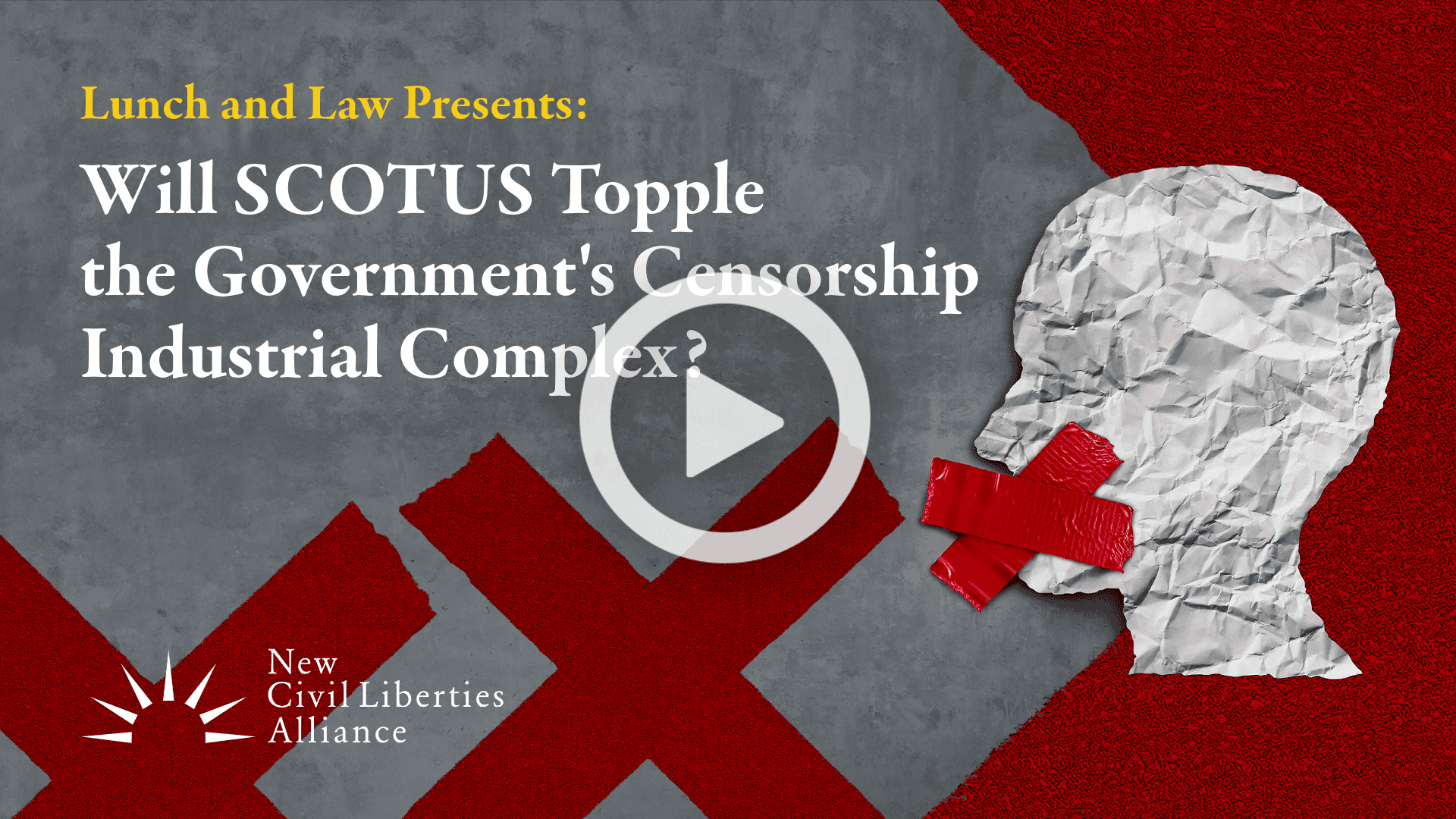
Our panel of expert appellate litigators discuss Murthy v. Missouri
WATCH: Will SCOTUS Topple the Government’s Censorship Industrial Complex?
In our latest Lunch and Law series, NCLA’s Mark Chenoweth and Jenin Younes are joined by clients Dr. Jayanta Bhattacharya and Dr. Aaron Kheriaty to discuss the oral argument in Murthy v. Missouri and the government’s use of social media companies to execute a massive censorship regime. Watch here >>>
The King George III Prize is your chance to vote for the worst abusers of civil liberties
VOTE: NCLA’s King George III Prize Is Calling Out the Worst Government Abusers of Civil Liberties
NCLA is proud to announce the Fourth Annual King George III Prize—a campaign to call attention to the most egregious violations of our basic civil liberties by highlighting the people and institutions responsible for those abuses. In many cases, especially where the Administrative State is involved, the perpetrators are unelected, unaccountable bureaucrats protected by byzantine layers of regulatory process. Their violations are often hidden from public view, obfuscated by a lack of notice, circumvention of due process, and a damnably incurious press. But no more! The King George III Prize is here to shine the light on these constitutional misdeeds! Vote here >>>
Cases to Watch
NCLA will remain vigilant against future Administrative State attempts to unlawfully collect Americans’ information and property
NCLA Persuades Energy Dept. to Halt Unlawful ‘Emergency’ Demand for Cryptocurrency Mining Data
The Department of Energy and the Energy Information Administration settled NCLA’s lawsuit, which formally ends, for now, DOE’s attempt to force cryptocurrency mining companies to hand over sensitive information about their operations through a mandatory Cryptocurrency Mining Facilities Survey. NCLA alleged that the Office of Management and Budget had given EIA emergency permission to collect this data despite EIA’s failure to demonstrate that short-cutting the statutory process would prevent public harm, as federal law requires. Representing the Texas Blockchain Council and Riot Platforms, Inc., NCLA celebrates this victory in defense of privacy rights and the rule of law. Read more >>>
Mr. Smith has been trapped in SEC’s interminable adjudicatory version of the Hotel California
NCLA Asks Sixth Circuit to Free FINRA Hostage from SEC’s ‘Hotel California’ Adjudication Regime
NCLA has petitioned the U.S. Sixth Circuit Court of Appeals for a writ of mandamus to force the U.S. Securities and Exchange Commission to stop delaying its ruling on our client Eric S. Smith’s appeal of an unlawful Financial Industry Regulatory Authority disciplinary decision. FINRA banned Mr. Smith from the securities brokerage industry for life and heavily fined him based on faulty accusations and despite lacking any legal right to punish him in the first place. SEC has refused to rule on Mr. Smith’s subsequent appeal for over three years, depriving him of his livelihood, severely damaging his reputation and business prospects, and violating his statutory and constitutional rights. NCLA urges the Court to compel SEC to set aside FINRA’s disciplinary decision, or at least require the agency to rule on his appeal within 30 days. Read more >>>
NCLA client Jeanna Norris
NCLA Asks Supreme Court to Revisit 120-year-old Precedent that Led to Rights Abuses Amid Pandemic
On behalf of clients Jeanna Norris, Kraig Ehm, and D’Ann Rohrer, NCLA has petitioned the Supreme Court to hear Norris v. Stanley regarding Michigan State University’s unlawful and unscientific Covid-19 vaccine mandate. MSU fired two of NCLA’s three clients, all of whom had naturally acquired immunity to Covid, for refusing the vaccine. By conditioning their public employment on receiving unnecessary medical treatment, MSU violated their constitutional right to refuse medical intervention and ignored their statutory right to informed consent. NCLA’s petition for a writ of certiorari asks the Court to hold that the 1905 Jacobson v. Massachusetts decision requires states to satisfy at least intermediate scrutiny before mandating their employees receive an unnecessary vaccine. NCLA further urges the Court to hold that MSU’s policy failed to meet that standard. Read more >>>
Dr. Vengalattore enlisted NCLA’s help in taking Cornell to court for this injustice
NCLA Demands Trial to Prove Ex-Professor’s Case Against Cornell’s Title IX Kangaroo Court
NCLA filed a brief opposing summary judgment in its client Dr. Mukund Vengalattore’s lawsuit alleging that Cornell University’s biased and faulty sexual misconduct investigation discriminated against him in violation of Title IX and defamed him. Dr. Vengalattore was a tenure-track Cornell University physics professor when a former graduate student’s false 2014 sexual misconduct allegation launched an utterly due-process deficient Title IX investigation that ruined his promising career. Cornell’s scheme was driven in part by the university’s Title IX office, which succumbed to pressure from the Department of Education to slant its investigatory and adjudicatory processes against men accused of sexual misconduct. NCLA’s brief asks the U.S. District Court for the Northern District of New York to reject Cornell’s request for summary judgment and proceed with trial in Vengalattore v. Cornell, allowing a jury to resolve the case’s many factual disputes and clear Dr. Vengalattore’s good name. Read more >>>
Congress set up the SEC to ensure ‘fair and orderly markets,’ not to authorize Gary Gensler’s social engineering experiments
NCLA Asks en Banc Fifth Circuit to Vacate Legally Defective Nasdaq Board Diversity Rules
NCLA has filed an opening brief in National Center for Public Policy Research v. SEC urging the en banc U.S. Court of Appeals for the Fifth Circuit to set aside Nasdaq’s unconstitutional “Board Diversity Rules,” which SEC promulgated without statutory authority. These Rules impose gender, race and sexual orientation quotas on corporate board membership for Nasdaq-listed companies. Further, the Rules compel companies that fail to meet their board seat quotas to explain why or face involuntary delisting from the stock exchange. Under a related rule, SEC will furnish lists of quota-satisfying names to companies unable to meet such quotas on their own. A Fifth Circuit panel had upheld the Board Diversity Rules, but the en banc court granted NCLA’s request to rehear the case. The 1934 Securities and Exchange Act limits SEC’s regulatory role to ensuring fair and honest markets, investor protection, orderly and efficient markets, and facilitating capital formation. SEC cannot venture outside of those statutory guardrails as it did here. Read more >>>

On the heels of Murthy v. Missouri, NCLA is petitioning SCOTUS to accept Changizi v. HHS
NCLA Asks Supreme Court to Resolve Circuit Split over Standing in Social Media Censorship Cases
NCLA has petitioned the U.S. Supreme Court for a writ of certiorari in Changizi, et al. v. HHS, a lawsuit combating the government’s unconstitutional assault on freedom of speech. NCLA’s petition asks the Court to resolve a circuit split between the Fifth and Sixth Circuits on what plaintiffs must show to satisfy Article III standing in censorship cases against the government. Officials in the Department of Health and Human Services (HHS) have violated the First Amendment by directing social media companies to censor viewpoints that conflict with HHS’s Covid-19 messaging. The petition urges the Court to overturn the U.S. Court of Appeals for the Sixth Circuit ruling that NCLA clients Mark Changizi, Michael Senger, and Daniel Kotzin lacked standing to challenge the censorship regime that silenced them on X (Twitter). Read more >>>
Click here for more cases to watch
Friends of the Court

The rule prohibits speech that expresses disparaging views of another person based on 11 characteristics
NCLA Advises Supreme Court to Hear Case Against PA Ethics Rule’s Viewpoint-Based Discrimination
NCLA filed an amicus curiae brief in Greenberg v. Lehocky, asking the Supreme Court to hear this important First Amendment case. NCLA’s brief encourages the Court to recognize that lawyers whose speech is chilled by Rule 8.4(g) of Pennsylvania’s Rules of Professional Conduct have standing to bring a pre-enforcement challenge. The Rule exposes attorneys to discipline—including sanctions that threaten their livelihoods—if the state bar decides their speech “constitut[es] harassment or discrimination” with respect to certain viewpoints whether in the practice of law or related thereto. A district court struck the Rule down, but the U.S. Court of Appeals for the Third Circuit reversed that decision, incorrectly contending that lawyer and law educator Zachary Greenberg lacked standing to challenge the Rule. Read more >>>
Congress may not divest to an agency legislative power that the Constitution vests in it, also known as the nondelegation doctrine
NCLA Brief Asks High Court to Forbid Congress from Divesting Legislative Power
NCLA filed an amicus curiae brief at the Supreme Court in Allstates Refractory Contractors LLC v. Su, challenging the Occupational Safety and Health (OSH) Act of 1970, which divested lawmaking power to the Occupational Safety and Health Administration. The OSH Act unlawfully grants OSHA untrammeled legislative power by authorizing the Secretary of Labor to create, modify, or revoke any occupational safety standard she deems “reasonably necessary or appropriate.” NCLA asks the Supreme Court to hear the case and disallow this unconstitutional transfer of core legislative power. Read more >>>
Click here for more amicus briefs to watch.
In the News
???? What’s Wrong with Censorship?, PragerU
???? Censorship, Guns, and Administrative Power: Mark Chenoweth Explains 3 Major SCOTUS Cases, EPOCH TV
???? Younes: SCOTUS Must Protect The 1st Amendment. The Biden Admin Certainly Won’t, Daily Caller
???? Supreme Court must rely on the First Amendment, not its own precedent, when deciding government censorship case, Washington Examiner
???? ‘Vindictive Operation’: Oldest Federal Judge Speaks Out Against Colleagues’ Effort To Remove Her From The Bench, Daily Caller
???? SEC Should Cut Its Dystopian Follow-On Enforcement Proceedings, Bloomberg Law
???? FAQs re Murthy v. Missouri, Reason
???? Abridging, Not Coercing, Is The First Amendment’s Yardstick for Speech Violations, Reason
???? NCLA’s Jenin Younes Previews Supreme Court Argument in Murthy v. Missouri, The Rod Arquette Show
Click here for more media mentions.
Administrative Cartoon
Permission granted to reprint with attribution

